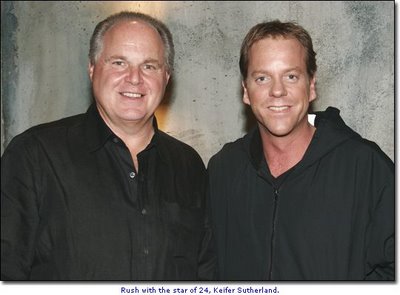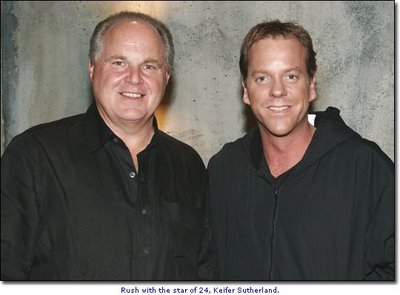Taliban Man at Yale
The story thus far.
Thursday, March 23, 2006 12:01 a.m.
Something is very wrong at our elite universities. Last month Larry Summers resigned as president of Harvard; today Libyan dictator Moammar Gadhafi will speak by video to a conference at Columbia University that his regime is cosponsoring. (Columbia won't answer questions about how much funding it got from Libya or what implied strings were attached.) Then there's Yale, which for three weeks has refused to make any comment or defense beyond a vague 144-word statement about its decision to admit Sayed Rahmatullah Hashemi--a former ambassador-at-large of the murderous Afghan Taliban--as a special student. The three backers of the foundation that, along with Yale, is subsidizing Mr. Hashemi's tuition have told the Yale Daily News that they are withdrawing their support. But the university remains mute and paralyzed. "The intelligentsia haven't told Yalies what to think yet, because even they haven't made up their minds," says Daniel Gelernter, a Yale freshman whose father is a Yale professor. He clearly has: He calls the Taliban "an evil and macabre terrorist group. . . . The fact that Hashemi didn't do actual killing does not absolve him. Goebbels didn't shoot anyone either."
Universities are places where free inquiry, debate and information sharing are supposed to be guiding lights. In reality, the ivory towers too often now resemble dark castles, which raise their drawbridges at the first hint of criticism or scrutiny. Never has the moat separating elite universities from the rest of America been wider than in the case of Yale's Taliban Man.
In justifying its grant of a place to Mr. Hashemi, Yale has cited his approval by the State Department. And Yale's sole official statement says it hopes "his courses help him understand the broader context for the conflicts that led to the creation of the Taliban and to its fall. . . . Universities are places that must strive to increase understanding." That justification is unsettling to two women who will join voices at Yale tonight. Natalie Healy lost her Navy SEAL son Dan in Afghanistan last year when a Taliban rocket hit his helicopter. Ms. Healy, who notes that her son had four children of his own, is appalled at Yale's new student. "Lots of people could benefit from a Yale education, so why reward this man who was part of the group that killed Dan?" she told me. "I want to tell [Yale President] Richard Levin that his not allowing ROTC on campus is one thing, but welcoming a former member of the Taliban is deeply insulting to families who have children fighting them right now."
Ten days ago Ms. Healy met Malalai Joya, a member of Afghanistan's parliament, when she spoke near her home in Exeter, N.H. Tonight, Ms. Joya will speak at Yale on behalf of the Afghan Women's Mission. She is appalled that many people have forgotten the crimes of the Taliban, and was surprised to hear that Mr. Hashemi, who, like her, is 27 years old, is attending Yale. "He should apologize to my people and expose what he and others did under the Taliban," she told me. "He knew very well what criminal acts they committed; he was not too young to know. It would be better if he faced a court of justice than be a student at Yale University."

 Mr. Hashemi probably won't be attending Ms. Joya's lecture tonight. He has dodged reporters for three weeks, ever since his presence at Yale was revealed in a cover story in the New York Times Magazine. Some claim he has fully repented his Taliban past, but in his sole recent interview--with the Times of London--he acknowledged he'd done poorly in his class "Terrorism: Past, Present and Future," attributing that to his disgust with the textbooks: "They would say the Taliban were the same as al Qaeda." At the same time, Mr. Hashemi won't explain an essay he wrote late last year in which he called Israel "an American al Qaeda" aimed at the Arab world. When asked about the Taliban's public executions in Kabul's soccer stadium, he quipped: "There were also executions happening in Texas."
Mr. Hashemi probably won't be attending Ms. Joya's lecture tonight. He has dodged reporters for three weeks, ever since his presence at Yale was revealed in a cover story in the New York Times Magazine. Some claim he has fully repented his Taliban past, but in his sole recent interview--with the Times of London--he acknowledged he'd done poorly in his class "Terrorism: Past, Present and Future," attributing that to his disgust with the textbooks: "They would say the Taliban were the same as al Qaeda." At the same time, Mr. Hashemi won't explain an essay he wrote late last year in which he called Israel "an American al Qaeda" aimed at the Arab world. When asked about the Taliban's public executions in Kabul's soccer stadium, he quipped: "There were also executions happening in Texas."
[RFR: This is a great example of moral equivalence which the "Yale Taliban" used to his advantage. Rather than addressing the Taliban's execution, he turns the tables by citing executions in Texas as if they were equivalent, thus silencing any criticism. But are they equivalent? Without knowing anything of the specifics of either execution, we can still surmise enough facts to show how bogus this response was. Regarding the Taliban execution, based on what we know of how they operated, this woman was probably killed for some "crime" such as learning to read; teaching others to read; perhaps being caught without wearing a veil; maybe even because she was raped. Raped? you may ask. Yes, in many Muslim countries, rape victims are executed because they must have done something to provoke the rape. Whatever her "crime", it's likely she was denounced by someone, given a cursory interrogation, then driven to the stadium and shot.
Regarding the Texas execution. Even though I am opposed to capital punishment, it is not because I feel that these criminals are not bad people. To get the death penalty, even in Texas, the criminal must have really committed a pretty heinous crime. In addition, he was caught and brought to trial, was represented by an attorney, and only convicted (with multiple appeals) when his guilt was established *beyond a reasonable doubt*.
Yes, Taliban dirtbag, we have executions in Texas. So, what's your point?
Given his record as a Taliban apologist, Mr. Hashemi has told friends he is stunned Yale didn't look more closely into his curriculum vitae. "I could have ended up in Guantanamo Bay," he told the New York Times. So how did he end up in the Ivy League? Questions start at the State Department's door. Sen. John Cornyn of Texas, chairman of the Judiciary Committee's border security panel, has asked the State Department and Homeland Security Secretary Michael Chertoff to explain exactly how Mr. Hashemi got an F-1 student visa. Yale's decision tree is clearer. Richard Shaw, Yale's dean of undergraduate admissions until he took the same post at Stanford last year, told the New York Times that Yale had another foreigner of Mr. Hashemi's caliber apply but "we lost him to Harvard" and "I didn't want that to happen again." Mr. Shaw won't return phone calls now, but emails he's exchanged with others offer insights into his thinking.
The day after the New York Times profile appeared, Haym Benaroya, a professor at Rutgers, wrote to Mr. Shaw expressing disbelief that Mr. Hashemi, who has a fourth-grade education and a high school equivalency certificate, could be at Yale. Mr. Shaw replied that he indeed had "non-traditional roots [and] very little formal education but personal accomplishments that had significant impact." Mr. Benaroya was stupefied; did Mr. Shaw mean accomplishments that had a "positive impact, not terroristic and totalitarian impact"? Mr. Shaw responded: "Correct, and potential to make a positive difference in seeking ways towards peace and democracy. An education is a way toward understanding the complex nuances of world politics."
Back in the early 1990s, when he was dean of Yale College, Yale history professor Don Kagan warned about what he called the university's "mutual massage" between value-neutral professors and soft-minded students. He is even more critical now: "The range of debate on campus is more narrow than ever today, and the Taliban incident is a wake-up call that moral relativism is totally unexamined here. The ability of students to even think clearly about patriotism and values is being undermined by faculty members who believe that at heart every problem has a U.S. origin." [What a tragedy. Yale is considered one of our countries elite institutions of higher learning. However, instead of teaching students critical thinking, their heads are stuffed full of moral relativistic mush. Consequently, they can't tell right from wrong, good from evil. What's more disturbing, is they're taught by their professors that they shouldn't make such distinctions.] Mr. Kagan isn't optimistic that Yale will respond to outside pressure. "They have a $15 billion endowment, and I know Yale's governing board is handpicked to lick the boots of the president," he told me. "The only way Yale officials can be embarrassed is if a major donor publicly declares he is no longer giving to them. Otherwise, they simply don't care what the outside world thinks."
But there may be one other source of worry for Yale. Mr. Hashemi told the New York Times that he will apply next month for sophomore status in Yale's full-degree program starting next fall. An admissions official told me Yale's plan all along was to do just that if his grades were acceptable. But next week, Yale will mail out 19,300 rejection letters to those who applied to be in its class of 2010. "I can't imagine it'll be easy for Yale to convince those it rejects that the Taliban student isn't taking a place they could have had," a former Yale administrator told me.

Former Yale president Benno Schmidt says admitting Mr. Hashemi is an exercise in "amorality and cynicism." He told me that "diversity simply cannot be allowed to trump all moral considerations." It's not as if Yale can't muster moral indignation. Yale is divesting from Sudan, responding to pressure from student activists and labor unions. But when it comes to a former Taliban official, there is a desire to move on. A case in point is Amy Aaland, executive director of Yale's Slifka Center for Jewish Life, where Mr. Hashemi takes his meals (Kosher complies with Islamic dietary laws). When I asked her if any of the revelations about his past disturb her, she noted that he was "very, very young" when he had been a Taliban official, and that "it's not like the Taliban attacked this country." I asked about the Taliban's decree in May 2001 that all non-Muslims--chiefly Hindus--had to wear yellow badges. The order, reminiscent of the Nazis, was met with global censure. A reporter then in Kabul recalls Mr. Hashemi had no trouble defending the decree as a protection for minorities against punishment by the religious police "until I pointed out it also required non-Muslims to move out of housing they shared with Muslims within three days; he didn't have a coherent response to that." Ms. Aaland absorbed all that I told her, and replied: "I don't expect learning to happen overnight." She still thought that "just living here, [Mr. Hashemi] can learn values and ideals from our society."
There is a line beyond which tolerance and political correctness become willful blindness. Eli Muller, a reporter for the Yale Daily News, was stunned back in 2000 when the lies of another Taliban spokesman who visited Yale "went nearly unchallenged." He concluded that the "moral overconfidence of Yale students makes them subject to manipulation by people who are genuinely evil." Today, you can say that about more than just some naïve students. You can add the administrators who abdicated their moral responsibility and admitted Mr. Hashemi.
Copyright © 2006 Dow Jones & Company, Inc. All Rights Reserved.
















 Mr. Hashemi probably won't be attending Ms. Joya's lecture tonight. He has dodged reporters for three weeks, ever since his presence at Yale was revealed in a cover story in the New York Times Magazine. Some claim he has fully repented his Taliban past, but in his sole recent interview--with the Times of London--he acknowledged he'd done poorly in his class "Terrorism: Past, Present and Future," attributing that to his disgust with the textbooks: "They would say the Taliban were the same as al Qaeda." At the same time, Mr. Hashemi won't explain an essay he wrote late last year in which he called Israel "an American al Qaeda" aimed at the Arab world. When asked about the Taliban's public executions in Kabul's soccer stadium, he quipped: "There were also executions happening in Texas."
Mr. Hashemi probably won't be attending Ms. Joya's lecture tonight. He has dodged reporters for three weeks, ever since his presence at Yale was revealed in a cover story in the New York Times Magazine. Some claim he has fully repented his Taliban past, but in his sole recent interview--with the Times of London--he acknowledged he'd done poorly in his class "Terrorism: Past, Present and Future," attributing that to his disgust with the textbooks: "They would say the Taliban were the same as al Qaeda." At the same time, Mr. Hashemi won't explain an essay he wrote late last year in which he called Israel "an American al Qaeda" aimed at the Arab world. When asked about the Taliban's public executions in Kabul's soccer stadium, he quipped: "There were also executions happening in Texas." 

